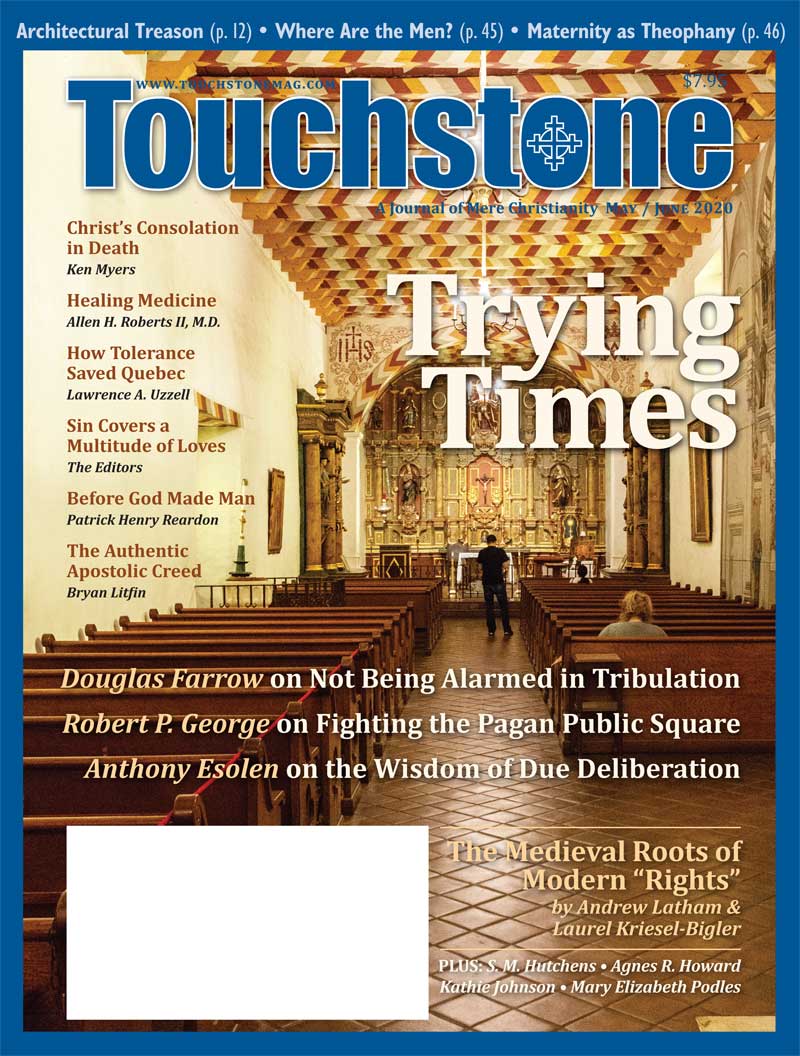Editorial
The Fog of Love
Sin Covers a Multitude of Loves
Peter Buttigieg, Democrat candidate for the presidency, has said that if Jesus were among us today, he would surely approve of the relations that Buttigieg and his sexual partner enjoy, because Jesus was about love, and love, as everyone knows, makes the world go round.
And round, and round, as Scripture confirms. Said Amnon about his own sister, "I love Tamar," and his friend Jonadab played the procurer accordingly (2 Sam. 13:4). That rape caused implacable enmity between Amnon and his half-brother Absalom, with terrible consequences for their father David and his kingdom. And Solomon "loved many strange women, together with the daughter of Pharaoh," and those many wives "turned away his heart after other gods" (1 Kings 11:1,4). But God punished that gentle and all-are-welcome apostasy by dividing the kingdom north and south.
We enjoy having our predilections slicked and oiled with flattery: "The prophets prophesy falsely, and the priests bear rule by their means; and my people love to have it so" (Jer. 5:31). Babylon was soon to fall upon that self-satisfied and enlightened people. The women of Judah fell in fashionable love with the fertility gods of their neighbors. Says Ezekiel: "Then he brought me to the door of the gate of the Lord's house which was toward the north; and behold, there sat women weeping for Tammuz" (Ezek. 8:14). Milton puts that scene nicely:
[T]he Love-tale
Infected Sion's daughters with like heat,
Whose wanton passions in the sacred Porch
Ezekiel saw, when by the Vision led
His eye surveyed the dark Idolatries
Of alienated Judah. (Paradise Lost, 1.452–457)
Our wickedness is made no better for our being committed to it: "And this is the condemnation, that light is come into the world, and men loved darkness rather than light, because their deeds were evil" (John 3:19). "Amor condusse noi ad una morte," says Francesca in the circle of the lustful in Dante's hell, referring to herself and her illicit lover: "Love led us to one death" (Inferno 5.106). Amor meus, pondus meum, said Augustine: Love is the weight that tosses us in one direction or another. It can toss us to heaven or toss us to hell.
Grasping the Good
"You are using the word love in equivocal senses," someone may object. "We are talking about the genuine article, and not about lust." Lust, affection, friendship, sexual desire, charity—the word love covers a multitude of passions, many of them present in the same person at the same time. But that is precisely why we fallen human creatures must not allow ourselves to be fooled by a word or a feeling. We do not know how to love. So we must not interpret Scripture according to our flailing and uncertain passions, but instead permit Scripture to put those passions in order. We must not say, "I am all right with the Lord, because I experience what is called love." We must say, "Unless the Lord sets my soul in order, I shall not know what love really is"—love, as when the purest of the evangelists, John, says, "God is love" (1 John 4:8).
We may say that love is at least what the wisest of the pagans held it to be, benevolence, to wish well for another, and we may look to the Lord for a certain measure of support: "But I say unto you, Love your enemies, bless them that curse you, do good to them that hate you, and pray for them which despitefully use you" (Matt. 5:44). But when we ask what it means, specifically, to "do good," the Lord refers us not to benevolent feelings but to the boundless mercy of God, who "maketh his sun to rise on the evil and on the good, and sendeth rain on the just and on the unjust," and to his perfection, his holiness: "Be ye therefore perfect, even as your Father which is in heaven is perfect" (Matt. 5:45, 48).
In our state, we do not grasp fully or surely what the good is; and if in these matters we Christians set aside the revealed word of God, we are at best like bad surgeons with good intentions. We can saw and cut and love the patient to death. At the worst, we have no desire to learn humbly how to distinguish good from evil, but we call good what seems good to us, like the sad lost souls of the Israelites in the days of the judges, when "every man did that which was right in his own eyes" (Judg. 21:25).
Jesus' Specifics
Anthony Esolen is Distinguished Professor of Humanities at Thales College and the author of over 30 books, including Real Music: A Guide to the Timeless Hymns of the Church (Tan, with a CD), Out of the Ashes: Rebuilding American Culture (Regnery), and The Hundredfold: Songs for the Lord (Ignatius). He has also translated Dante’s Divine Comedy (Random House) and, with his wife Debra, publishes the web magazine Word and Song (anthonyesolen.substack.com). He is a senior editor of Touchstone.
bulk subscriptions
Order Touchstone subscriptions in bulk and save $10 per sub! Each subscription includes 6 issues of Touchstone plus full online access to touchstonemag.com—including archives, videos, and pdf downloads of recent issues for only $29.95 each! Great for churches or study groups.
Transactions will be processed on a secure server.
more on sex from the online archives

28.2—March/April 2015
Man, Woman & the Mystery of Christ
An Evangelical Protestant Perspective by Russell D. Moore
more from the online archives
calling all readers
Please Donate
"There are magazines worth reading but few worth saving . . . Touchstone is just such a magazine."
—Alice von Hildebrand
"Here we do not concede one square millimeter of territory to falsehood, folly, contemporary sentimentality, or fashion. We speak the truth, and let God be our judge. . . . Touchstone is the one committedly Christian conservative journal."
—Anthony Esolen, Touchstone senior editor













